We were thrilled to host the first of our new ADRC seminar series last Wednesday and welcomed a range of attendees including academics, practitioners, students and community members.

Latest research and knowledge exchange news at Bournemouth University
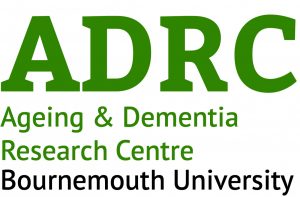


We’re thrilled to invite you to the first online seminar in the new ADRC series on Wednesday, December 4th, from 3-4pm. This session will feature Dr. Michele Board from Bournemouth University, presenting on the topic: Veterans and Dementia: A Collaborative Research Project.
The Ageing and Dementia Research Centre (ADRC) at Bournemouth University, with funding from Dementia Research UK, launched a 2023/4 project focused on ex-military veterans—a typically underserved group in dementia research. The project explores veterans’ experiences through collaborative creative workshops, culminating in a documentary-style short film that amplifies their voices and personal stories. During this seminar we will share our film, highlight implications for practice and discuss the next stages of our project.
The seminar is open to all Bournemouth University staff, students, community organisations, and anyone interested in the topic.
Please keep an eye out for upcoming seminars throughout the new year!
Key Details:
• Date: Wednesday 4 December 2024
• Time: 3-4pm
• Topic: Veterans and Dementia: A Collaborative Research Project
• Speaker: Dr. Michele Board, Associate Professor Nursing Older People and Co-Lead Ageing and Dementia Research Centre ADRC
See you there!
Microsoft Teams
Scan the QR code below or click on this link: https://teams.microsoft.com/l/meetup-join/19%3ameeting_ZGI0NjE1YTUtNTIzYy00NTljLTk2OTEtYWZiNTc1ZmRjYzUy%40thread.v2/0?context=%7b%22Tid%22%3a%22ede29655-d097-42e4-bbb5-f38d427fbfb8%22%2c%22Oid%22%3a%22612fce03-de45-44e3-b1e6-8404efc1b742%22%7d
Meeting ID: 364 666 916 013
Passcode: wJyC7U


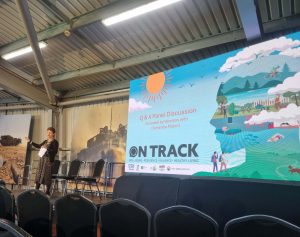
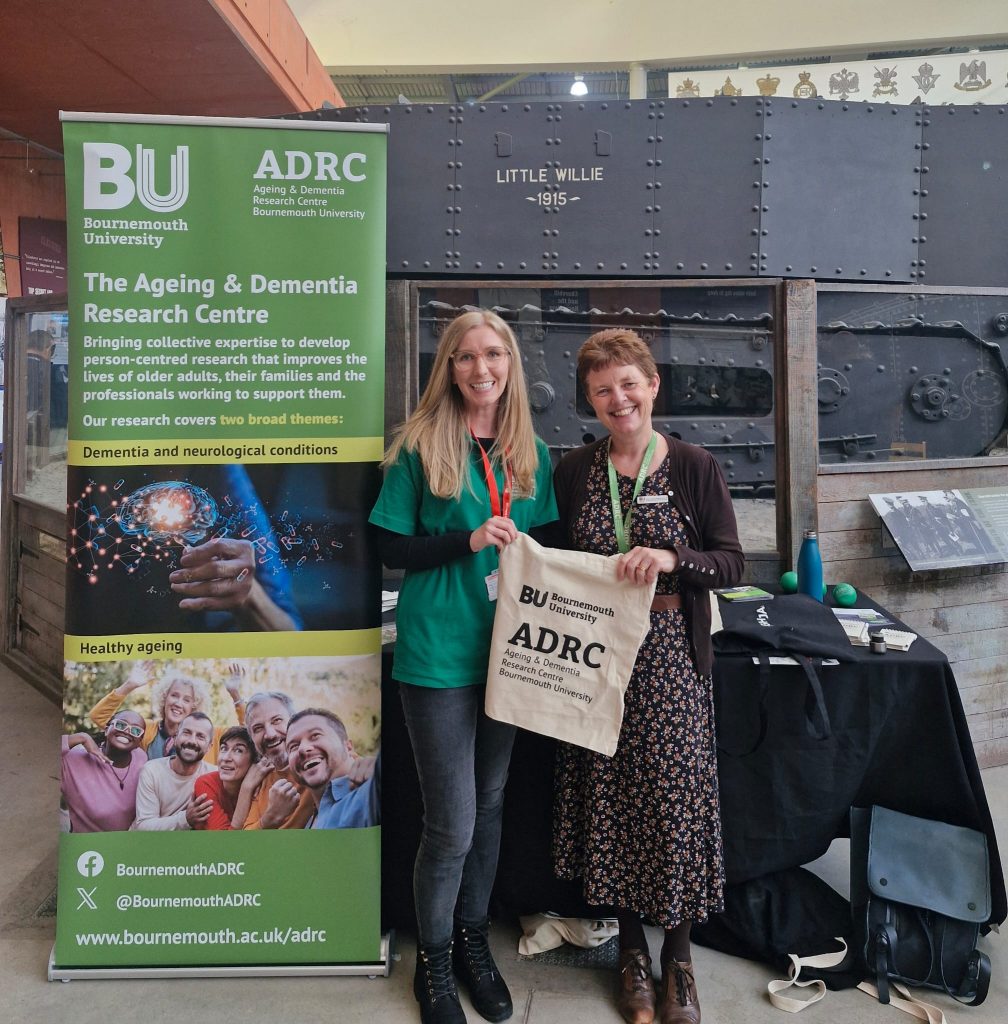
I am undertaking a research placement as part of my studies on the MSc Foundations of Clinical Psychology. In my role as a research assistant, I have been working on a project that aimed to introduce the idea of travelling using Virtual Reality headsets for people with dementia and their caregivers/ family members. Virtual reality (VR) technology presents a promising means of bridging geographical divides and empowering individuals with dementia to participate in their communities in ways that were not possible prior to diagnosis. Additionally, research has demonstrated the value of virtual reality in helping people with dementia remember their past, revisit their hometown, or most treasured vacation spots. The purpose of this project is to evaluate how virtual reality can support people with dementia with travel and explore the impact on their wellbeing.
This is a collaborative pilot research study involving BU staff from the Ageing and Dementia Research Centre (ADRC) (Dr. Michelle Heward, Dr. Catherine Talbot, Dr. Michele Board, Dr Aisling Flynn, Lyndsey Bradley) and the International Centre for Tourism and Hospitality Research (ICTHR) (Dr. Daisy Fan, Prof. Dimitrios Buhalis) alongside colleagues from PramaLife (Sue Warr and Jo Keats) and is funded with QR funding from the Department of Psychology. We collected data on campus, and I was able to support this and had an opportunity to engage with the participants. The participants were asked to come to 2 sessions. The first session consisted of a session in the Blended Learning Interactive Simulation Suite, also known as the BLISS room. In this room, the participants and their caregivers were given the chance to play interactive VR games of their choice on the walls or visit different parts of the UK, such as London and Oxford. The second session consisted of using the VR headsets, where the participants were able to use the headsets themselves, which allows them to virtually experience other parts of the world, by looking around and having access to a 360 view, of a location of their choosing, whether that be somewhere they had never been to or reminisce about places they have been.
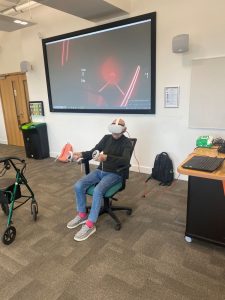
Given this immense opportunity to relive and reminisce about their previous experiences around the world, and their respective homes, the reception was overall a positive one. The participants left feeling positive about having virtually visited places from their past and having engaged with places they have never been to or would like to go to in the future. They provided some useful insights and feedback to inform future research in this area. We now move towards analysing and publishing the data.
Roshin Sibu
For more information about this project please email Michelle mheward@bournemouth.ac.uk
on behalf of Professor Debbie Holley
I am delighted to report that Dr Michele Board, Dr Heidi Singleton and I were invited to share our virtual reality research as part of the Wessex Academic Health Science Network webinar on 16.03.2023. Dr Board presented her work on ‘walk through dementia’, which brings the reality of lived experiences places the viewer in the shoes of the person with dementia. More information about this projects and the collaboration with the Alzheimer’s Society are available from the ADRC website.
Dr Singleton and I presented on our work on the mental health 360 video scenarios we created for student nurse education which have been embedded within the curriculum.
Evaluated via Focus group discussions (n=6 students) and an online survey (n=33 thus far); with 94% of nursing students reporting that the videos were extremely or very useful for their learning.
“It flags up potential extra considerations in practice that you wouldn’t anticipate with just the theoretical teaching. You can better visualise.” (Student Nurse 31)
“It made me feel confident in how to interact with an individual who may be having a mental health breakdown.” (Student Nurse 15)
“It showed me that you can take time and check the correct information and repeat steps when assessing and treating a patient.” (Student Nurse 8)
The learning resources mean that students can link theory to practice and can repeat the activity at any point during their course and from any location.
Thanks to the wider team Ursula Rolfe, John Moran, Emma Collins and our former colleague Jasmine Snowden,
Pooja Shah, a postdoctoral researcher working on the Tangerine project (aiming to develop a novel intervention to improve nutrition and promote healthy ageing among older people from South Asian and Afro Caribbean communities in the UK) attended a roundtable discussion at the King’s Fund to explore what a greater focus on nutrition could mean for the health care system and those at risk of malnutrition. Discussion focused on the causes, prevalence, diagnosis and response to malnutrition. This included how we can engage those working across the health and care system at a national and local level – including primary care, social care, and those with clinical expertise – with improving the early diagnosis of malnutrition through patient screening, greater awareness, and the use of tools for better population health management. In the context of an ageing population, the roundtable also provided an opportunity to discuss the role of improved nutrition and targeted interventions in enabling people to remain independent for as long as possible.
The Kings Fund are delighted to share their recent blog, based on the roundtable discussion.
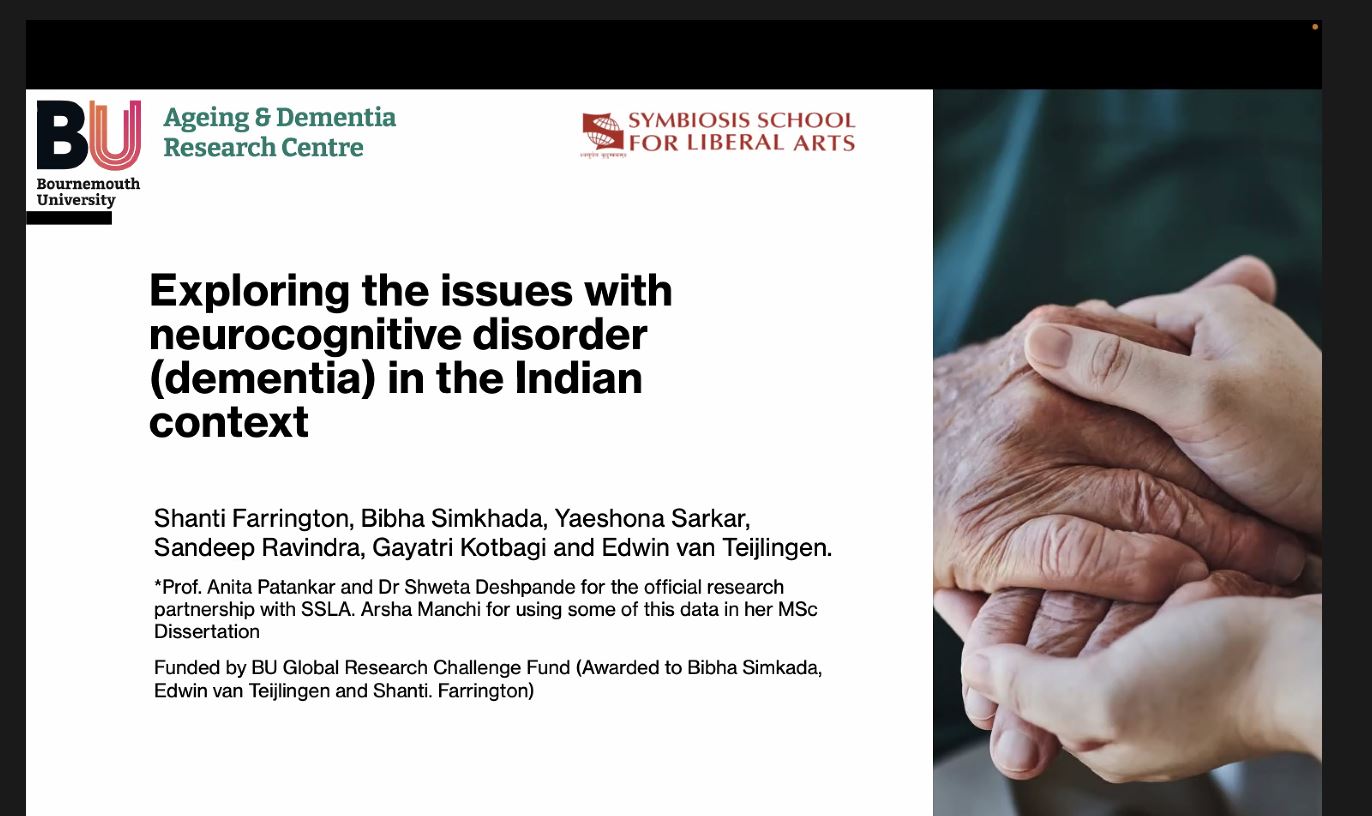 Today Dr. Shanti Farrington, Principal Academic in Psychology, presented our research work on dementia in India today. She was invited to speak to the ‘Research Participation Group of the Ageing & Dementia Research Centre (ADRC) at Bournemouth University. She addressed a range of interesting issues, for example she spoke about lack of training of health care workers in dealing with people living with dementia, but also in lack of experience in diagnosing different forms of dementia. She also spoke about the lack of experts neurologists in India, and the ageing population in this vast country.
Today Dr. Shanti Farrington, Principal Academic in Psychology, presented our research work on dementia in India today. She was invited to speak to the ‘Research Participation Group of the Ageing & Dementia Research Centre (ADRC) at Bournemouth University. She addressed a range of interesting issues, for example she spoke about lack of training of health care workers in dealing with people living with dementia, but also in lack of experience in diagnosing different forms of dementia. She also spoke about the lack of experts neurologists in India, and the ageing population in this vast country.
The discussion with the online audience also covered the role of diet in prevention of dementia and the limitations of using online health promotion material and general information on dementia in English, where some many languages are spoken. The underpinning research was largely funded by GCRF (Global Challenges Research Fund).
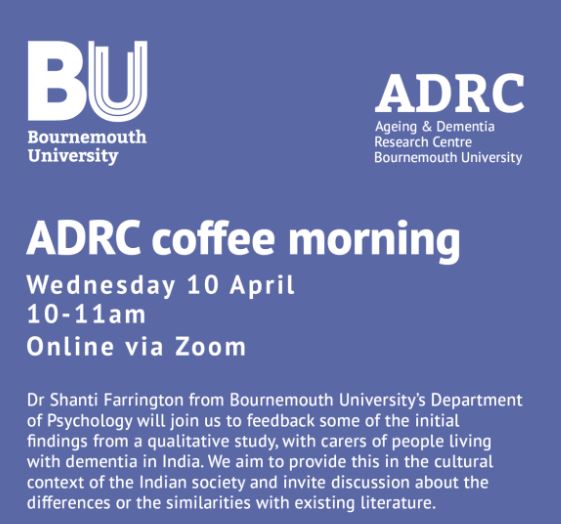
Prof. Edwin van Teijlingen
CMWH (Centre for Midwifery & Women’s Health)
We had a fantastic time identifying research priorities with local older people at the ADRC coffee morning on 12th July 2023.
During the event we heard from Bournemouth University researchers (see below) about their projects. After lunch, we spent time discussing local issues and research gaps that were pertinent to the group. Attendees highlighted a wide range of topics from nutrition to knickers (yes really!). We hope to take forwards some of these ideas in our future research and are working with a smaller number of the group to discuss how they might become more involved in developing research as co-researchers – watch this space for further updates!
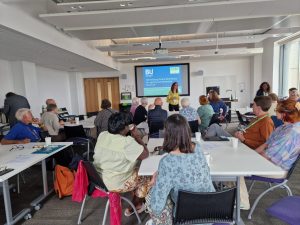
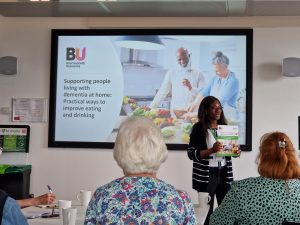
Thanks to all attendees and speakers for the engaging discussions which made the event so enjoyable:
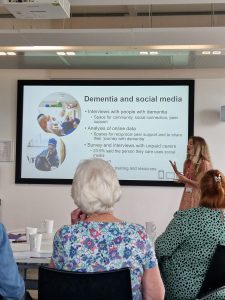
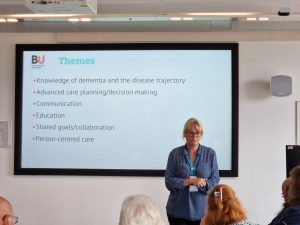
Thanks also to the British Society of Gerontology* (BSG) for funding this event under the Small Grant scheme!
If your research is focused on ageing or dementia and you would like to present at a future ADRC coffee morning please email adrc@bournemouth.ac.uk
*Please note the views expressed and discussions may not represent the views of the BSG. For more information about the BSG, visit https://www.britishgerontology.org/
Details of the next ADRC ageing and dementia research forum are listed below. The forum is an opportunity for staff and PhD students to get together to chat about research and share experiences in a safe and supportive environment. Specific topics are discussed but there is also time for open discussion to mull over aspects of research such as project ideas and planning, ethical considerations and patient and public involvement.
| Date, time, and campus | Research areas |
| 29th June 2023
15.00-15.45 BG601, Bournemouth Gateway Lansdowne Campus |
‘Digital health coaching for older people with frailty in Wessex (DIALOR) ’Rachel Christie |
If you would like to discuss your research ideas at a future meeting, please email Michelle mheward@bournemouth.ac.uk
We look forward to seeing you there.
Ageing and Dementia Research Centre
The Ageing and Dementia Research Centre (ADRC) at Bournemouth University currently run a monthly coffee morning for local older people and others interested in ageing and dementia research to socialise and discuss and share feedback on our work. We have received funding from the British Society of Gerontology (BSG) Small Events Fund to run the session on 12th July (11am-2.30pm) at Bournemouth Gateway Building to enable us to build upon our current model and support the development of a team of older people as co-researchers to take forwards research that is a priority for them.
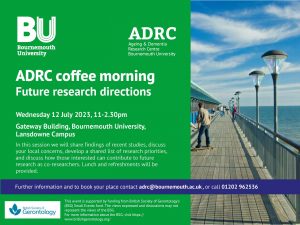
The aim of this event is to:
1. Disseminate the findings of research projects undertaken by Bournemouth University Ageing and Dementia Research Centre to local older people.
2. Discuss concerns of local older people to support development of an ageing and dementia research priority list.
3. Identify older people interested in becoming co-researchers to take forwards ideas from the ageing and dementia research priority list.
To book a place visit www.eventbrite.co.uk/e/future-directions-in-ageing-research-tickets-654816091557
For further information on this event please contact mheward@bournemouth.ac.uk
Funding statement and Disclaimer: This event is supported by funding from British Society of Gerontology’s (BSG) Small Events fund. The views expressed and discussions may not represent the views of the BSG. For more information about the BSG, click here: https://www.britishgerontology.org/
On 10th May 2023 we welcomed our regular group of local older people and practitioners to the ADRC coffee morning. In this session, we heard about collaborative work on the impact of drumming on health and wellbeing. Firstly, Dr Kim Brown from Nature Therapy Community Interest Company (CIC) introduced her work aimed at building sensory resilience with unique arts-based projects involving horses, wolves, forests, the sea, medicine wheel, labyrinths, and art and music including drumming. The research team (Dr Michelle Heward, Dr Caroline Ellis-Hill, and Lyndsey Bradley) then shared findings from a research project focused on drumming with people with dementia (for more detail see paragraph below). The group then had a go at drumming – it was very lively, and everyone enjoyed taking part!
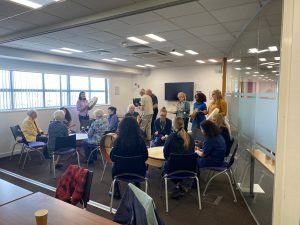
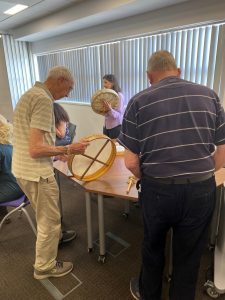
Drumming for dementia research
Nature Therapy have developed a level one Drumming for Dementia online course, to support family carers and care staff in health and social care settings to use drumming with people with dementia. The research project involved evaluating the impact of the course in care and home environments and was funded by the Burdett Trust for Nursing ‘Small Grants 2020 programme’. The findings demonstrate that it is possible to gain confidence to practice drumming with people with dementia through the level one course provided by Nature Therapy CIC. And that these have led to positive impacts in terms of reduced agitation and greater engagement for those living with dementia.
To access the course visit https://www.naturetherapyonline.com/ click on ‘more’ and then ‘drumming for dementia course’.
For more information about the study please email adrc@bournemouth.ac.uk
Future ADRC coffee mornings
ADRC coffee mornings are a forum for local people, practitioners, and researchers to meet to discuss ideas for research and share research findings. They take place on the second Wednesday of the month and are mostly virtual with an occasional face to face session. If you would like to present your research to the group at a future coffee morning, please contact adrc@bournemouth.ac.uk
We are holding our second ageing and dementia research forum for those interested in research in this area. The forum is an opportunity to get together to chat about research and share experiences in a safe and supportive environment. Specific topics are discussed but there is also time for open discussion to mull over aspects of research such as project ideas and planning, ethical considerations and patient and public involvement.
The next forum meeting is approaching so if you would like to join us, please email adrc@bournemouth.ac.uk so we can send you the meeting details.
| Date, time, and campus | Research areas |
| 24th November 2022
15.30-17.00 BG601, Bournemouth Gateway Lansdowne Campus |
Hadeel Alhatamleh ‘End of life care for people with dementia in hospitals’ |
If you would like to discuss your research ideas at a future meeting, please email Michelle mheward@bournemouth.ac.uk
We look forward to seeing you there.
Ageing and Dementia Research Centre
Are you interested in Mental Health Research and engaging with researchers across Wessex?
Join us for a seminar (6 October 2022) given by Professor Sam Chamberlain, Professor of Psychiatry, University of Southampton and NIHR ARC Wessex Mental Health Research Hub Lead.
He will highlight projects currently supported through the Mental Research Hub, as part of the NIHR ARC Wessex. The Hub aims to bring together researchers from different disciplines and partners throughout the region to plan and conduct research and look at ways to implement findings at the point of care. It also encourages and support new research talent through mentorship, internships, a summer school, and new post-doctoral positions.
This seminar will provide a valuable opportunity to find out more about the Mental Health Research Hub, engage with researchers in Wessex to develop new research and potentially be involved with current projects.
Please sign up asap using this Eventbrite link (venue to be confirmed)

In line with this Dementia Action Week, the e-Learning Dementia Education and Learning Through Simulation 2 (e-DEALTS 2) programme was launched on 16th May 2022. The launch event was well attended by members caring for those with dementia, health and care staff in contact with people with dementia, hospital and residential care management representatives, researchers and academics.
The Ageing and Dementia Research Centre at Bournemouth University were commissioned by Health Education England to develop the e-DEALTS2 toolkit. The e-DEALTS 2 programme is a simulation-based training programme designed to support trainers to deliver dementia training online to health and social care staff and volunteers who require Tier 2 training (i.e., those who have regular contact with people with dementia, clinical and non-clinical).
The underlying principle of the e-DEALTS2 training is to provide opportunities to understand the lived experience by putting attendees into the shoes of a person with dementia.
Looking forward, we are excited to evaluate the toolkit for future research development. If you would like to be contacted by the Ageing & Dementia Research Centre about the eDEALTS2 and receive any further updates, please complete the Bournemouth University form by visiting: https://forms.office.com/r/H3q5UP7TX1
The eDEALTS2 toolkit is now available on the Health Education England website. To download, please visit https://tinyurl.com/y2228tak
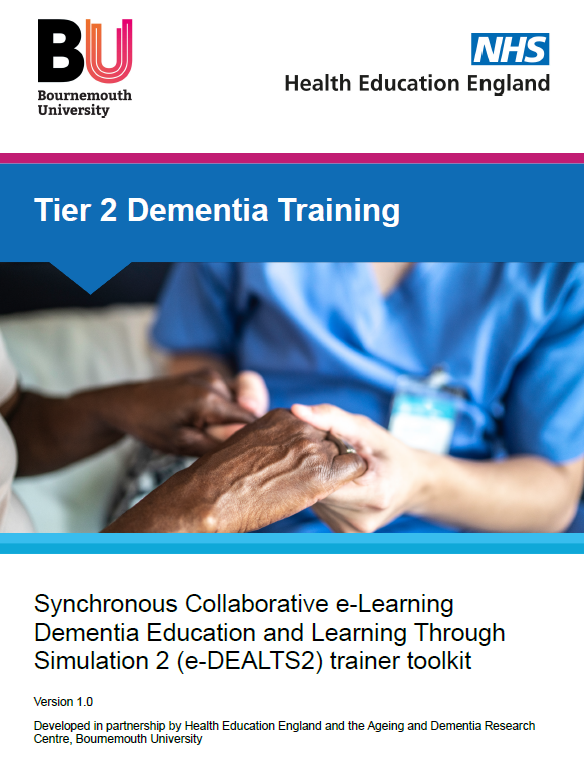

e-Learning Dementia Education and Learning Through Simulation 2 (e-DEALTS 2) now successfully launched!
In line with this Dementia Action Week, the e-Learning Dementia Education and Learning Through Simulation 2 (e-DEALTS 2) programme was launched on 16th May 2022. The launch event was well attended by members caring for those with dementia, health and care staff in contact with people with dementia, hospital and residential care management representatives, researchers and academics.
The Ageing and Dementia Research Centre at Bournemouth University were commissioned by Health Education England to develop the e-DEALTS2 toolkit. The e-DEALTS 2 programme is a simulation-based training programme designed to support trainers to deliver dementia training online to health and social care staff and volunteers who require Tier 2 training (i.e., those who have regular contact with people with dementia, clinical and non-clinical).
The underlying principle of the e-DEALTS2 training is to provide opportunities to understand the lived experience by putting attendees into the shoes of a person with dementia.
Looking forward, we are excited to evaluate the toolkit for future research development. If you would like to be contacted by the Ageing & Dementia Research Centre about the eDEALTS2 and receive any further updates, please complete the Bournemouth University form by visiting: https://forms.office.com/r/H3q5UP7TX1
The eDEALTS2 toolkit is now available on the Health Education England website. To download, please visit https://tinyurl.com/y2228tak
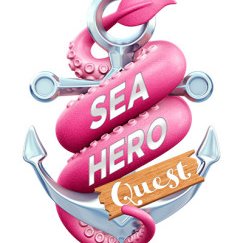 I am absolutely delighted to be part of the amazing Sea Hero Quest team. Sea Hero Quest is a game for mobile phones in which users solve navigation tasks. With more than 4 million contributors/players it is one of the largest citizen science projects ever. We used Sea Hero Quest to analyse navigation performance of several hundred thousand participants. In this Nature paper – which came out today – we showed that people who grew up in rural areas have better spatial navigation skills that those raised in cities.
I am absolutely delighted to be part of the amazing Sea Hero Quest team. Sea Hero Quest is a game for mobile phones in which users solve navigation tasks. With more than 4 million contributors/players it is one of the largest citizen science projects ever. We used Sea Hero Quest to analyse navigation performance of several hundred thousand participants. In this Nature paper – which came out today – we showed that people who grew up in rural areas have better spatial navigation skills that those raised in cities.
Follow the links below for more information about the paper and Sea Hero Quest:
Excellent thread by @antoine_coutrot on our new @nature article:
"Entropy of city street networks linked to future spatial navigation ability"
With co-lead @m_hornberger
& @edthink @GoodroeSarah @cgahnstrom @demetyesiltepe @Ruth_C_Dalton @Jan_Wiener https://t.co/RZ0TptUfBY— Prof Hugo Spiers (@hugospiers) March 30, 2022
People who grow up in gridlike cities like New York seem to struggle to navigate as easily as those who come from rural areas or intricate cities, researchers reported. The findings one day may lead to better tests for early dementia. https://t.co/Eqg5idfCdu pic.twitter.com/sB3nS8drZz
— The New York Times (@nytimes) March 30, 2022
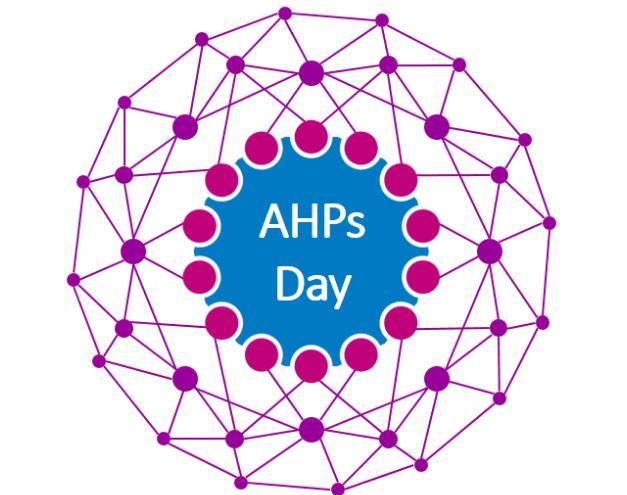
The Allied Health Professions (AHPs) are the third largest clinical workforce in the NHS and represent a total of 14 professions which are regulated by the Health Care Professions Council and the individual profession specific regulatory bodies. Research is supported nationally and regionally through the Council for Allied Health Professions Research and at BU through our partnership collaboration with the Applied Research Collaboration NIHR Wessex.
To celebrate the 4th Annual AHP day at BU we are showcasing some of the research that is being carried out by the AHP academic community in Dorset.
Dr Katie Collins – Research focuses on the hidden impairments following a stroke and how they impact on individuals participating in active life. I am involved in exploring health equity and the impacts of health inequality and supervising a Dorset Health Care University Foundation Trust (DHCFUT): BU match funded PhD studentship exploring interventions for successful contracture management.’
Dr Vikram Mohan – Current project which has QR funding is aimed at exploring the reliability and validity of the Total Faulty Breathing Scale (TFBS). In clinical practice abnormal breathing patterns are recognised, but there are no scales to quantify the severity of abnormal breathing patterns. These findings will be applied to conditions like Covid-19, COPD etc.
Peter Philips – PhD – “What factors affect resilience in newly qualified paramedics in the UK ambulance service?” Aims to explore stressors that newly qualified paramedics face in their first year of registration, how they seek to cope with those stressors, and what effect these have. This research will have an impact on workforce planning, recruitment, and retention of staff in the NHS.
Helen Ribchester – PhD- Exploring sense making derived from the clinical practice experiences of student Occupational Therapists in India. An This is an IPA study including elements of poetic inquiry, with participants drawn from the students of an occupational therapy programme in an Indian university (SRIHER)
Sara Sayer and Prof Carol Clark – ‘Heading for Trouble’ project, with pump prime funding, involving external stakeholders and an interdisciplinary team from the Faculty of SciTec (Prof Hamid Bouchachia, Prof Hana Burianova, Dr Ala Yankouskaya, Dr Shanti Shankar) aiming to explore brain scans and questions relating to attention and memory in professional footballers. Supporting health in football.
Dr Theo Akudjedu and Dr John Totman – working within the Institute for Medical Imaging and Visualisation (IMIV) a multidisciplinary collaboration of clinicians and scientists using a Siemens 3T MRI scanner for research projects to image liver, pancreatic and biliary disease and the brain.
Dr Ursula Rolfe – co-published with David Partlow a paramedic colleague from practice – Mental Health Care in Paramedic Practice The book provides paramedics with key information on a range of mental health conditions and their management. The roles of paramedics have changed in the last decade with increases in the number of 999 calls associated with the increasing mental health needs of people.
Dr Louise Fazakarley, Dr Katie Collins and Dr Caroline Ellis-Hill – supervising a funded MRes Carrie Tbaily ((DHCFUT) – Exploring caregiver perspectives of adults with severe and profound and multiple Learning disabilities accessing sedentary hydrotherapy.
Dr Louise Fazakarley – Pump prime funding to; examine the effectiveness of Physiotherapy in the early stage of Parkinson’s disease (PD): a review of the literature and Patient and Public Involvement (PPI) consultation to identify research priorities for patients with early-stage PD
Sam Page (Dorset County Hospital (DCH)), Dr Louise Fazakarley and Dr Zoe Sheppard (DCH) -ARC Wessex NIHR funding to undertake a service evaluation relating to patients who sustain pubic rami fracture and their management at home supporting better care for patients.
Dr Caroline Ellis-Hill – research focus is on humanising practice, based on existential understandings from lifeworld approaches and focuses on what make us feel human. Humanising practices are those that incorporate fully human knowing and support a sense of connection and wellbeing. Caroline has funding from the Welcome Trust – Exploring performance arts education for the stroke rehabilitation pathway, is supervising PhD students as part of the INNOVATEDIGNITY project funded by the European Commission and NIHR funding for a multicentre RCT of community-based arts and health intervention to increase psychological wellbeing in people following stroke.
Prof Carol Clark – supervising Rosie Harper (University Hospitals Dorset (UHD) with Dr Carly Stewart (BUBS) and Sally Sheppard (UHD) on a UHD; ARC Wessex NIHR; BU match funded studentship ‘Nudging: a theoretical concept for a very practical approach to pelvic floor muscle training’ Aimed at improving adherence to exercises aimed at reducing incontinence and improving health and well-being of women. Carol is currently Co-PI with Stefi Andrew (Portsmouth Hospitals University Trust) and Dr Zoe Sheppard (DCH)on NIHR ARC Wessex Exploring digital technologies for hand rehabilitation and Danni Swaithe (UHD), Dr Louise Johnson (UHD) Dr Shanti Shankar (SciTech) NIHR ARC Wessex, exploring the role of attentional focus on learning for physical recovery in acute stroke, research initiation award.
Prof Jane Murphy Co-Lead of the Aging and Dementia Research Centre current project includes NIHR ARC Wessex funded, DONOR project (Digital cOachiNg fOr fRailty) to investigate whether a digital approach could be used alongside support from health coaches to help the lifestyle management of older people with frailty in its early stages. The DONOR project will look at whether these technologies can reduce the burden on health and care services by offering person-centred care and advice. The multidisciplinary research team will work together with stakeholders (people with frailty, carers, health coaches and AHPs) to develop and test a new digital approach, implemented across Dorset and West Hampshire. Jane provides consultancy services, works with the Wessex Academic Health Science Network and International partners and also has funding as part of the ASPIRE project with European funding.
Dr Jonathan Williams – is currently involved in projects broadly investigating clinical and sports biomechanics, including wobble board rehabilitation for diabetic neuropathy; learning and retention of infant CPR skills, quantifying spinal stiffness and movement through body worn sensors; facilitating physical activity through wearables; measurement of player load in Badminton and shoulder sensory-motor control. He is currently supervising MRes and PhDs projects with AHPs including Andy Watt and Debora Almeida.
Debora Almeida PhD – A novel output-based approach to infant CPR training to maximise skill retention and improve patient outcome after cardiac arrest. Paediatric cardiac arrest is a worldwide health problem with high rates of morbidity and mortality. Positive outcomes depend on high quality CPR. However, infant CPR skills decay within weeks or months after training. This project aims to create a tailored retraining schedule based on the performance and retention of iCPR skills.
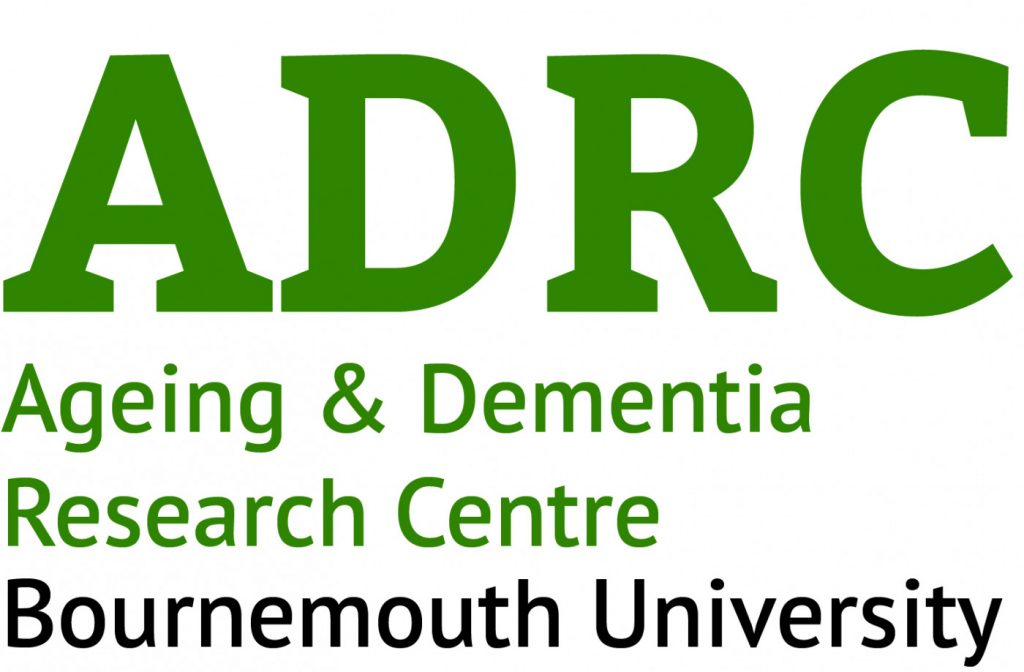 Many congratulations to Dr Michelle Heward, Dr Michele Board, Ashley Spriggs, Dina Blagden and Prof Jane Murphy from the ADRC for their new publication ‘Barriers and enablers to implementing ‘DEALTS2’ simulation-based train-the–trainer dementia training programme in hospital settings across England: a qualitative study” in BMC Health Service Research freely available now via this open access link: https://rdcu.be/cxuRO
Many congratulations to Dr Michelle Heward, Dr Michele Board, Ashley Spriggs, Dina Blagden and Prof Jane Murphy from the ADRC for their new publication ‘Barriers and enablers to implementing ‘DEALTS2’ simulation-based train-the–trainer dementia training programme in hospital settings across England: a qualitative study” in BMC Health Service Research freely available now via this open access link: https://rdcu.be/cxuRO
The team was commissioned by Health Education England (HEE) to develop and evaluate ‘DEALTS 2’, a national simulation-based education toolkit informed by the Humanisation Values Framework, developed at Bournemouth University and based on an experiential learning approach to facilitate positive impacts on practice. This paper reports on qualitative data collected from trainers nationally across England on the barriers and facilitators they faced when implementing the DEALTS2 dementia training toolkit in their employing Trusts.
This builds on other papers about DEALTS2, outlining:
(i) the impact of the DEALTS2 training on trainer knowledge of dementia and confidence to deliver innovative training approaches: https://www.sciencedirect.com/science/article/pii/S0260691720315446
(ii) the protocol for evaluating the impact of this intervention on practice across England: https://www.cambridge.org/core/journals/international-psychogeriatrics/article/abs/design-and-evaluation-protocol-for-dealts-2-a-simulationbased-dementia-education-intervention-for-acute-care-settings/0D6D58EB6D24257F6454E6AB0AF69E7D